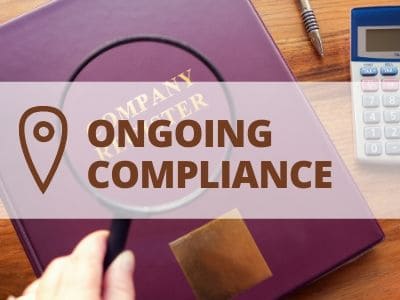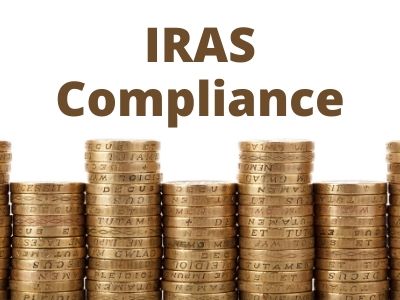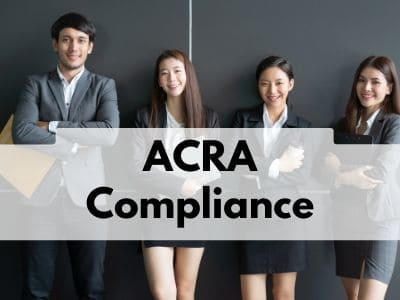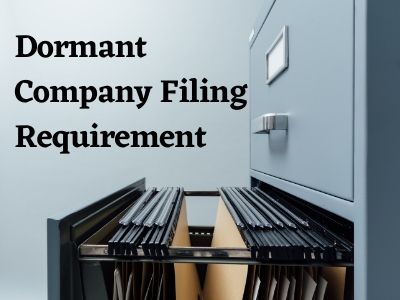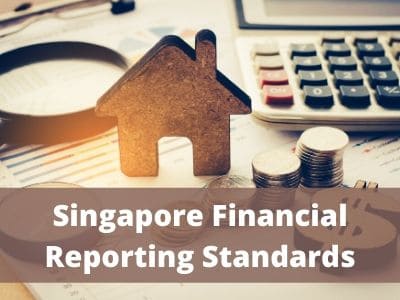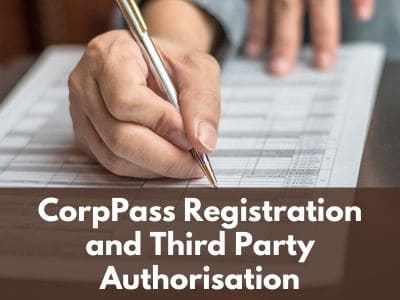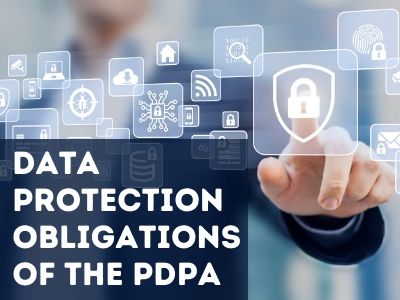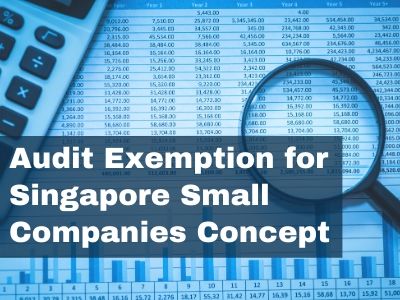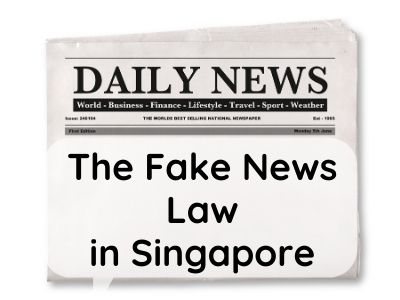This post is also available in:
 简体中文 (Chinese (Simplified))
简体中文 (Chinese (Simplified))
Corporate Compliance Requirement in Singapore
Singapore attracts plenty of foreign investors each year who are ready and eager to establish a base of business in this thriving business hub. It is very important for these investors to understand and know the corporate compliance regulations and requirements in Singapore during both the pre-incorporation and post-incorporate process of setting up a business.
All Singapore companies investors must comply with the requirements in each of the following areas listed below within the stipulated timeline as follows:
| No. |
Description |
Timeline |
| 1 |
Appointment of First Company Secretary |
within six months from the date of incorporation |
| 2 |
Appointment of Auditor |
within three months of the date of incorporation unless it is exempted from audit requirements |
| 3 |
Change of Company’s and Officers’ Particulars |
within 14 days from the date of change |
| 4 |
Stamping of transfer share agreement |
Within 14 days after signing the document |
| 5 |
Financial Year End |
Companies incorporated before 31 August 2018 will have their financial year end (“FYE”) deemed by law to be the anniversary of the date previously notified to the Registrar as their FYE date. In the absence of such notification before 31 August 2018, the anniversary of the date of incorporation will be deemed by law to be their FYE. Companies can change their FYE by notifying ACRA before or after 31 August 2018. Company is incorporated on or after 31 August 2018 must notify the Registrar of its FYE upon incorporation |
| 6 |
Lodging of Annual Return with ACRA |
For Companies with financial year end (“FYE”) ending before 31 Aug 2018, within 30 days from the AGM date.
For Companies with FYE ending on or after 31 Aug 2018, within 7 months after FYE |
| 7 |
Hold the first annual general meeting (AGM) |
For Companies with FYE ending before 31 Aug 2018, within 18 months from the date of incorporation or 6 months from FYE date, whichever earlier.
For Companies with FYE ending on or after 31 Aug 2018, within 6 months from FYE |
| 8 |
Hold subsequent annual general meeting (AGM) |
For Companies FYE ending before 31 Aug 2018, within 6 months from its FYE or within 15 months from the last AGM, whichever earlier and once in every calendar year.
For Companies with FYE ending on or after 31 Aug 2018, within 6 months from FYE. |
| 9 |
Preparation of Financial Statements
* A company qualifies for audit exemption if it is a private company and meets at least 2 of 3 following criteria for immediate past two consecutive financial years:
- Total Annual Revenue of the company is less than $10 million
- The number of employees in that company is less than 50
- The Total Assets of the business are not amounting to more than $10 million
** A dormant company is exempt from preparation of financial statement |
must not be more than six months old from the date of the AGM |
| 10 |
Filing Financial Statements in XBRL format with ACRA
* Required if a company has a corporate shareholder and is active for the financial period or if a company is insolvent |
Submit together with Annual Return to ACRA |
| 11 |
Estimated Chargeable Income (ECI) submission to IRAS |
Within 3 months from its financial year end date |
| 12 |
Form C or Form C-S submission to IRAS |
30 November in the year following the financial year |
| 13 |
Goods and Services Tax (GST) Registration
Compulsory registration is required when
- Past 12 months of taxable turnover exceeded $1 million
- Expect your taxable turnover in the next 12 months to be more than $1 million
Voluntary Registration is allowable but must remain registered for at least 2 years. |
Within 30 days |
| 14 |
Registration with Singapore Central Provident Fund |
When you hire the first employee |
When a company is incorporated in Singapore, the company is obligated to comply with the statutory requirements which have been stipulated in the Singapore Companies Act. Companies will be required to adhere to the annual filing requirements set forth by ACRA and the IRAS. Read more
As part of the statutory compliance, all companies which are legally registered in Singapore will be required to submit an ECI along with Form C as part of their annual tax returns to IRAS. An ECI is an estimate of the company’s chargeable income for the Year of Assessment. Read more
ACRA compliance is a requirement for companies, limited liability partnerships and foreign companies. These companies are required to maintain beneficial ownership information in the form of a Register of Registrable Controllers. This information must be available to the public agencies upon request. Read more
Dormant Company Filing Requirement
A dormant company is one that does not have any revenue or income coming in during the given financial period, and this company will be considered dormant by IRAS. Companies need to note that there is some difference between what IRAS and ACRA define as dormant, and a company which is considered dormant by IRAS may be considered active by ACRA. Read more
Singapore Financial Reporting Standards
Companies would need to comply with the financial reporting standards so they will be able to enjoy public confidence while setting up an accounting standards process which is based on a strong and reliable foundation. Read more
CorpPass Registration and Third Party Authorisation
CorpPass is utilised by businesses and other entities such as associations or non-profit organisations as a digital business identity. This identity helps them complete transactions with Government agencies which are done online. CorpPass is a requirement for all local entities who bear a Unique Entity Number (UEN) and any foreign company who wants to access the Government-to-Business digital services in Singapore. Read more
Data Protection Obligations of the PDPA
Singapore takes its data security and privacy protection very seriously, and as such, organisations are required to comply with the entire Personal Data Protection Act 2012. Every organisation is responsible for personal data which is under their control. Read more
Audit Exemption for Singapore Small Companies Concept
Under this concept, companies which qualify as small companies will be able to reduce their regulatory costs since they would have fewer audit requirements to comply with. However, they will still be required to provide unaudited reports for assessment. Read more
Company Secretary and Its Role and Responsibility in Singapore
It is mandated by the Singapore Company Law that a Company Secretary must be appointed in every company as the compliance officer for that said company. Read more
AGM and Annual Return for a Singapore Private Limited Company
Singapore private limited companies are mandated to remain compliant with the ACRA requirements. Having an AGM is part of these requirements, among other things. Read more
How to Transfer Business Ownership to Singapore
As a business owner, it would be smart of prepare a well-planned exit as part of your plan to help you manage changes that take place which will affect your company. This contingency plan will help you prepare for the necessary steps you need to take to ensure the success and continuity of your business. Read more
Determining the Financial Year End
Each company in Singapore has to determine its own Financial Year End (FYE). The FYE is the completion of an accounting period. A company’s financial year-end does not necessarily need to fall on 31 December and can actually fall on any day within the year. Read more
A Guide on Register of Registrable Controllers
From 31 March 2017, companies, foreign companies and limited liability partnerships in Singapore are required to maintain a register of registrable controllers unless otherwise exempted. Read more
Guide on Register of Nominee Directors
The Companies Act in Singapore was amended to introduce the register of nominee directors of companies, an amendment which came into effect 31 March 2017. Read more
The Fake News Law in Singapore
Singapore’s Government ministers will have the authority to put an immediate halt to the dissemination of fake news online and met out punishment to those guilty of spreading these falsehoods. Read more
A Guide to Share Certificates
Share certificates in Singapore are issued by the Company Secretary. Each certificate contains a unique, distinguishing number which is recorded in the registrar or members. Read more
Home Office Scheme in Singapore with HDB and URA
Home Office Scheme in Singapore is available for private residential under the Urban Redevelopment Authority (URA) and for public residential under the Housing Development Board (HDB). Read more
Amendments to the Personal Data Protection Act and Spam Control Act
The year 2020 has seen significant global change, not just in world economies but also in the legislation that govern and safeguard nations. As we shift quickly into a digital economy, data becomes the most sought-after commodity and needs careful governance. Read more


